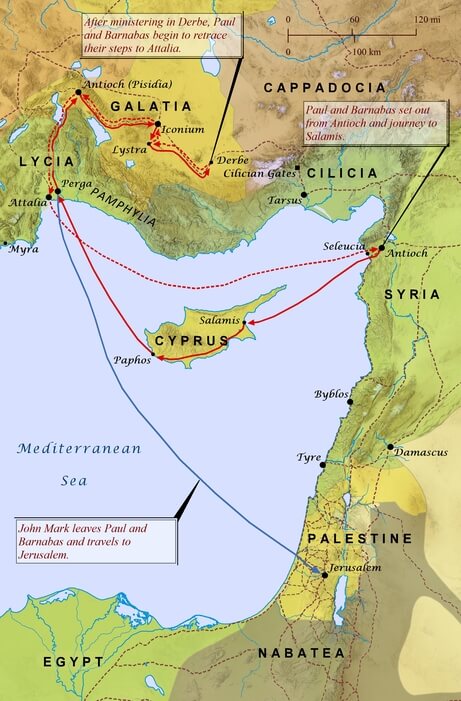Christ’s sacrifice has given believers a freedom; freedom to follow the Spirit and not the flesh.
Through the Galatians’ faith in Christ, they were called to freedom. The Spirit calls believers to live in the freedom that Jesus gives, rather than in bondage to sin and the law. Freedom is, in its essence, the ability to make choices. Slaves do not get to make choices, they simply do as they are told. This is an essential element of the grace of God. Jesus’ sacrifice upon the cross made every believer righteous in God’s presence, and gave them power over sin. But every believer still has a daily choice whether to walk in the resurrection power of Jesus or in the power of their old nature, the flesh. Each believer, from Paul’s time until now, can walk in one of two ways. One is to walk in love, the other to turn freedom into an opportunity for the flesh.
Although believers are made righteous in the sight of God, and given the power of the Holy Spirit to overcome sin, all believers still have an old nature, which Paul calls the flesh. Paul says in Romans 7:18 that nothing good dwells in our flesh. Even so, we can still exercise our freedom to choose by choosing to obey the flesh. That does not mean we will be made unrighteous in the sight of God. It is impossible to undo Jesus’ work on the cross by our behavior.
What does it mean then? It means when believers choose the flesh they will have the fruits of the flesh, the results or consequences of walking according to the flesh. Paul warns the Galatians that if they follow the flesh they will bite and devour one another because they will be consumed with selfish desires rather than a love for one another.
When believers choose the flesh it means they will not only bite and devour one another, but perhaps even be consumed by one another. That is not a good outcome, to say the least. Paul acknowledges the amazing freedom to choose that God grants every believer. But he also acknowledges that God made consequences for our actions; we will reap what we sow.
The contrast to making a poor choice, to carry out the desire of the flesh, is to make a good choice, to walk in the Spirit. What does that look like? When believers through love serve one another. Believers who walk by the Spirit won’t carry out the desires of the flesh. The Spirit and the flesh are direct enemies; we can’t pursue one and also follow the other. We get to choose, but our choice is binary. We can either obey the flesh or the Spirit. There is not a third option. Paul will make clear that following religious rules in order to seek to be justified is following the flesh.
Paul is telling the Galatians not to use their freedom to choose to follow the sinful desires of the flesh but to instead obey the Spirit by serving each other through love. This is what living by faith produces. Even the law could be summed up as this service to each other: You shall love your neighbor as yourself. The competing Jewish “authorities” want to appeal to the law? Fine, the law says to walk in love. That’s how to fulfill the law. Even their own appeal to the law is defeated by the law. This verse You shall love your neighbor as yourself, comes from Leviticus 19:18. Leviticus is from the section of the Old Testament that was referred to as the law.
The problem is not the law. The problem is that “law-keeping” is a “self-improvement” approach. And the flesh cannot be improved. That is why Paul advises believers to daily crucify the flesh
The Spirit is also not under the law, just as Paul showed the Galatians in chapter 2. When Peter ate with the Gentiles he was following the Spirit, not the law. And when he withdrew from the Galatians he was not walking in the Spirit (recall: You shall love your neighbor as yourself) but instead trying to obey man’s version of the law. As Paul argues in Romans 7:14, the Law of God is spiritual and good, but we are carnal. That is how we turn something meant for good into something bad.
Paul’s point is that the flesh and the Spirit are complete opposites. Our most fundamental choice as believers is choosing each day, each moment, which to obey.
Biblical Text
13 For you were called to freedom, brethren; only do not turn your freedom into an opportunity for the flesh, but through love serve one another. 14 For the whole Law is fulfilled in one word, in the statement, “You shall love your neighbor as yourself.”15 But if you bite and devour one another, take care that you are not consumed by one another. 16 But I say, walk by the Spirit, and you will not carry out the desire of the flesh.
Check out our other commentaries:
-
Matthew 12:9-14 meaning
Matthew narrates the second of four confrontations between Jesus and the Pharisees. The Pharisees set a trap for Jesus relating to the healing of a...... -
Matthew 26:45-50 meaning
Judas’s Betrayal: Jesus awakens His disciples to inform them that Judas has betrayed Him. Judas is accompanied by an armed crowd who have been sent...... -
Psalm 139:13-16 meaning
God had a direct hand in David’s creation, putting every part of him together in his mother’s womb. Thus, David knows that his existence is...... -
John 3:14-16 meaning
Jesus explains why He, God’s Messiah, has come to earth: He must die so that the world can receive eternal life. He compares himself to...... -
Matthew 1:12-16 meaning
Matthew concludes his genealogy of Jesus by covering the period from the Exile event to the birth of the Messiah. This section emphasizes Jesus’s role......



